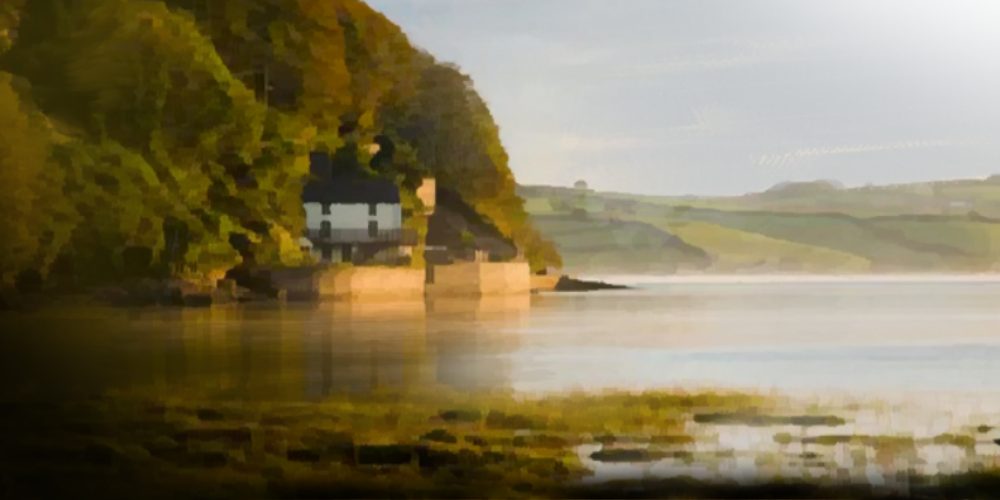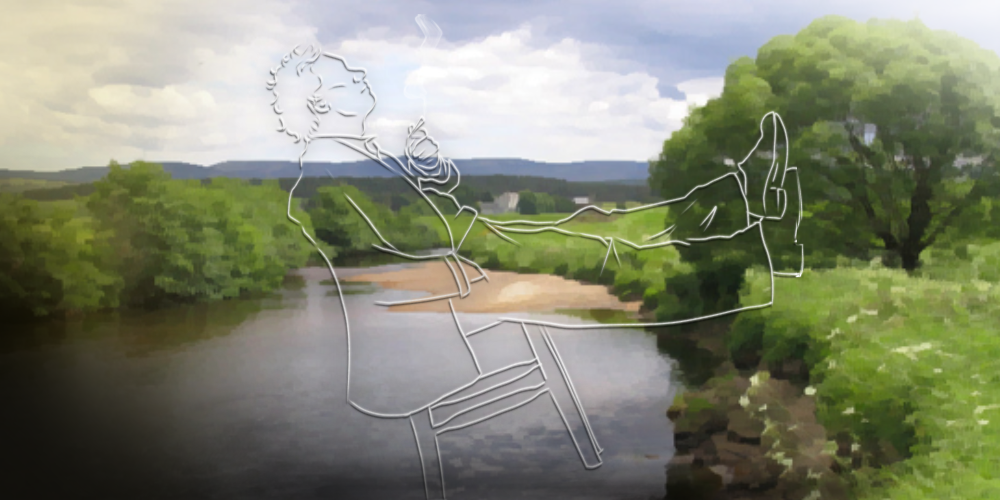It was not yet my birthday, but it might as well have been, for I was swerving through the hillside farmlands and quiet Welsh towns in the late winter sunlight on my way to Laugharne to see the poet’s boathouse and breathe the seaside air that infused his words. Laugharne of the old castle and the estuary at low tide, full of sea birds strutting on the sandbars, the button-down houses shoulder to shoulder with jamjars in the windowsills, and the empty window seat at the favored pub at Brown’s Hotel. Lovable Laugharne: described by the poet as, “the legendary, lazy, little black-magical bedlam by the sea.”
Past Brown’s Hotel and down the narrow alley to come upon the writing shed, as happy a box for wordsmithing as ever was, with its vaulted ceiling, views of the estuary, photos on the walls, shelves only half full of books, windows set to open to the sea breeze, and the obligatory messy desk on which lay papers filled with half-written, barely written and even unwritten poems, and finally a jacket hanging on the chair so that through the rain-dappled window that blurred the lines between then and now, I wondered if the poet had gone out for a walk or likely to the pub — any pub — and if I should wait for his shambling, stumbling return to ask him some question about herons or curlews or how the refrain of the tide could be cast into words.
Further down the alley and down the steps to the boathouse itself, perched on the side of the cliff and looking over the estuary like an eagle’s nest, bought for he and his wife by a benefactor. Into the living room with its armchairs in the corners and the door that opened down to the sea, and a radio with the sonorous voice of the poet finishing off “Should Lanterns Shine,” The ball I threw while playing in the park/ has not yet reached the ground. Oh, childhood, I thought, that wonderful, mischievous hero inside us, if only we could hold you in our arms now and forever.
Upstairs to the gallery to see the many projects, the writings, the stories, the play, the broadcasts that kept him occupied, the financial desperation that led to the tour of the USA that ultimately gave us so many lively recordings, the tales of matrimonial drunkenness (if not he then she and if not she then he, and often both) so that he was probably both boor and bore in public. And yet, the words. My birthday began with the water-/ birds and the birds of the winged trees flying my name/ Above the farms and the white horses/ And I rose/ in rainy autumn/ and walked abroad in a shower of all my days… Through the parables of sunlight and the legends of the green chapels. Discovered once in a now tattered and much-thumbed anthology while traveling around Southeast Asia and India, smitten and never forgotten. Finally, the unhappy ending: 18 whiskies — “must be some sort of record,” enough for a coma, pneumonia, and RIP.

A cup of tea in the tea room, where the poet dined — after the children — though he was keen to read to them in the evening, with windows on three sides and a view of everywhere, and a step out onto the deck where the weather turned round from blustery to rainy and back in a few ticks of the clock.
Back out to the alley, with the susurrus of the tide below and the parables of sunlight, rather than ascend the hillside to the grave site and pay homage with some impromptu blessings of whiskey (of which I had none), I was seduced down to the seaside trail that skirted the marshes of the estuary and meandered under the ruins of the castle that now imposed its thousand-year-old facade on wild brushes, and a glade of picnic tables and park benches favored by dog-walkers, dogged walkers and tourists, just not right now. Over a narrow footbridge that spanned the boisterous River Corran, and across the mouth of the silted harbor with its stranded tugs and skiffs, and cockles aplenty, into the woods and up St. John’s Hill for the birthday walk.
Up the trail, steep and slick, into the orchestra of trees playing the birds, the wind, and in the gaps already the view of the castle “brown as owls” and the estuary of the River Taf opening wide. Here I walked in a shower of all my days just days shy of my birthday and I read the verses on the information boards where the poet himself walked one morning before the town awoke and wrote it into his birthday poem known as “Poem in October.”
It was not yet my birthday but it might as well have been, for long had I wanted to do this birthday walk as a present to myself, an homage to Dylan Thomas’s spellbound words. As I ascended the path under the wonder of blue sky and wind-strewn clouds I saw the Boathouse clinging to the cliff and the tide slip away from the sandbars and salt marshes. Here in the legends of the green chapels could I marvel and I read the final verse aloud to the trees and the birds and the child within the man who was always arriving. “It was my fifty-fifth year to heaven/ stood there then in the summer noon… O may my heart’s truth still be sung on this high hill in a year’s turning.”
And with the culmination of the poem, I finished the walk and resumed my travels through the curves of the undulating farmland, and the weather turned round, as it always does here, and after a cloudburst, a rainbow blazed in the late winter sunlight — brilliant, ephemeral and just out of reach.•




